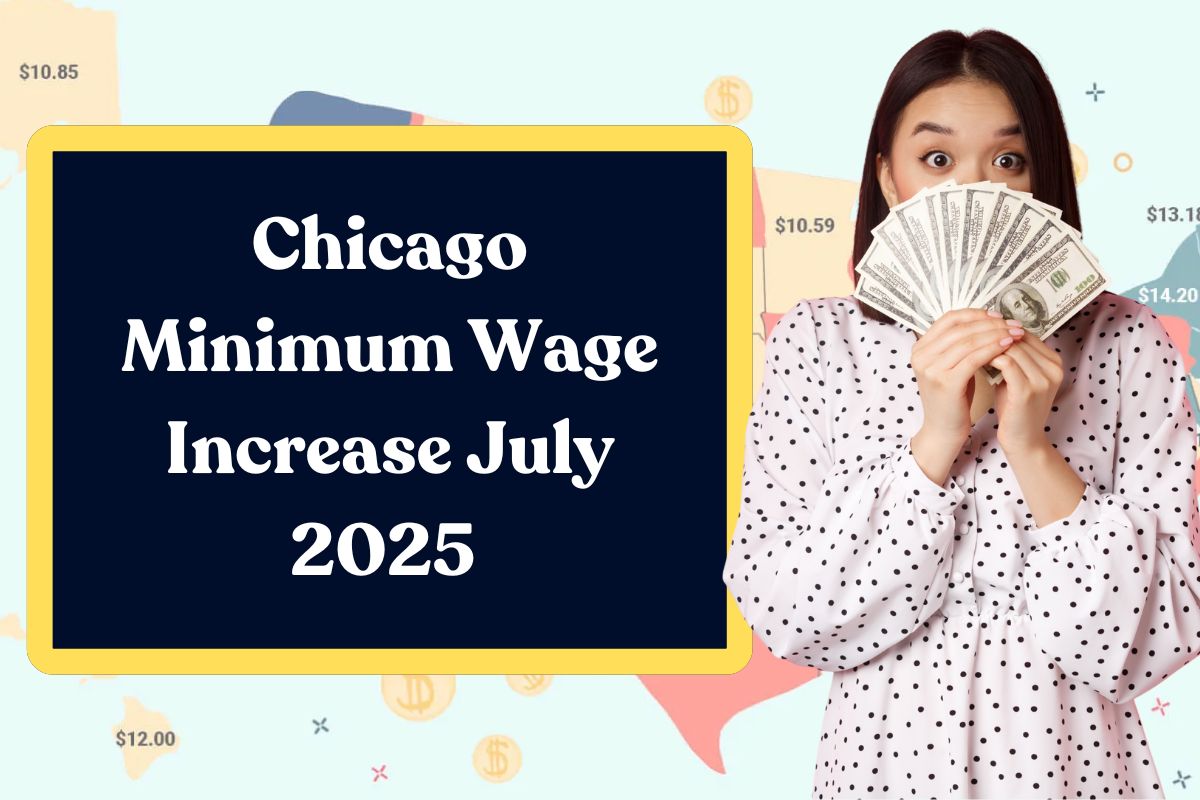On July 1, 2025, the minimum wage in Chicago increased to $16.60 per hour and $16.50 per hour for the subsidized youth employment programs. This change is a part of the Minimum Wage Ordinance of the City, which is tied to the Consumer Price Index, or 2.5% whichever is lower, which confirms that wages are keeping pace with the increasing daily living expenses.

The minimum wage for the tipped workers will be $12.62 per hour. This increase applies to those employers who have four or more employees. The CPI tracks the price of cost of living daily, and this structure aims to ensure that the adjustment in wages helps in coping with the rising inflation without destabilizing the operations of business.
Chicago Minimum Wage Increase July 2025
The City of Chicago Council claims that over 4,00,000 workers will get a raise in wages. The minimum wage rises annually on July 1st, and the sub minimum wages for the tipped workers are being phased out over five years that reaching parity with the standard minimum wage on July 1, 2028.

The Fair Workweek Ordinance does not apply to all workers with a collective bargaining agreement unless it does not fulfill the provisions of the ordinance. Covered employees are entitled to the advance notice, the right to decline work in the unscheduled hours, predictability pay for the schedule changes within 14 days, and also have the right to rest between shifts.
Overview of Chicago Minimum Wage Increase July 2025
| Article on | Chicago Minimum Wage Increase July 2025 |
| Country | United States of America |
| Department | Department of Business Affairs and Consumer Protection (BACP) |
| Effective on | July 1, 2025 |
| Standard minimum wage | $16.60 per hour |
| Category | Finance |
| Official website | Chicago.gov |
Increase in Chicago Minimum Wage Requirements
Chicago employers are required by the Minimum Wage Ordinance to inform covered employees of their rights concerning:

- The current minimum wage in Chicago is $16.60 per hour for employers with four or more employees.
- Fair Workweek (if applicable): This applies to certain industries like retail, hotels, manufacturing, healthcare, building services, and others.
- Paid Leave and Paid Sick Leave: the accrued paid leaves and paid sick leaves of the employees are based on hours worked, with significant rules for use, accrual, and payout upon termination.
- Wage Theft: employers also inform employees about their rights concerning wage theft.
Employers must provide this information in two different ways:

- Written notice with paycheck: By providing a written notice with each covered paycheck of the employee on or before July 31, 2025.
- Workplace poster: You can post a notice in a noticeable place at each facility in Chicago where employees work, advising them of these rights.
Those employers who do not fulfill notice requirements can face consequences and heavy penalties

Chicago minimum wage (as of July 1, 2025)
| Details | Minimum wage rates |
| Standard minimum wage | $16.60 per hour |
| Tipped employees | $12.62per hour |
| Subsidized youth employment and transitional employment programs | $16.50 per hour |
What other changes are coming?
In addition to the increase in minimum wages, Chicago is also enhancing other labor protections. The compensation threshold increased by the Far Workweek Ordinance, which provides predictable scheduling and also pays for late changes for the qualified employees in specific industries.
Furthermore, under the revised Paid Sick and Paid Leave and Safe Leave Ordinance guarantees that now employees are entitled for ten days of paid time off in a year which consist five days of general paid leave, which can also be used for any other reason and five days of paid sick leave and also allow employees to seek damages for violations.
Both types of leave will be accruing at the same rate, including one hour of leave for every 35 hours worked, and a limit of 40 hours within the 12 months. Paid sick leave becomes available for the employees after 30 days of employment, while the paid general leave becomes available by day 90 days.
It is noted that employers are not required to ask their employees about the reason behind their use of this general paid leave. Furthermore, the Fair Workweek Ordinance includes five particular industries, including restaurant, manufacturing, building services, healthcare, hotel, retail, or warehouse services, for employee earning $32.60 per hour or less $ or 62,561.90 annually, if their employer meets certain size criteria.
What does this mean for Employers and Employees?
The minimum wage increase has a major impact on the everyday lives of both employers and employees.
For Employers: The higher minimum wage supports employees, but it also creates challenges for employers as it financially impacts and directly affects the payroll cost of the business employing four or more employees.
These businesses need to make variations to their payroll system and have to review pricing strategies, and also consider cost-cutting measures. Those employers who do not fulfill notice requirements can face consequences and heavy penalties. Providing fair wages can improve employee morale and job satisfaction, and retention rates, which helps in reducing the cost of hiring and training.
For employees: The increased rates of minimum wage ensure a better standard of living for the low-wage earners and also help them in handling the rising cost of living expenses like food and housing. The rises in wages also lead to encouraging them and increasing their morale.
The predictability of schedules mandated by the Fair Workweek can lead to greater financial stability for hourly employees and also enable them to manage their budgets. It also offers an opportunity for growth to the current part-time employees to increase their earnings and their career progression.
Final thoughts
These Fair workweek ordinances represent a commitment to social justice and a more equitable distribution of the benefits of economic activity. The laws ensure that the workers in Chicago receive the minimum wage and the protection that they deserve. This increase applies to those employers who have four or more employees. Those employers who do not fulfill notice requirements can face consequences and heavy penalties





